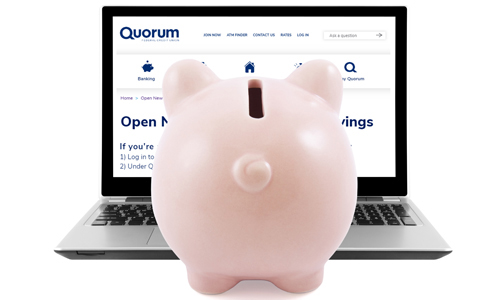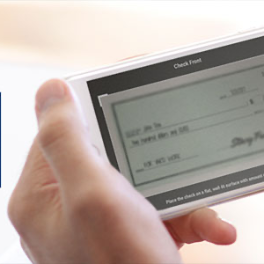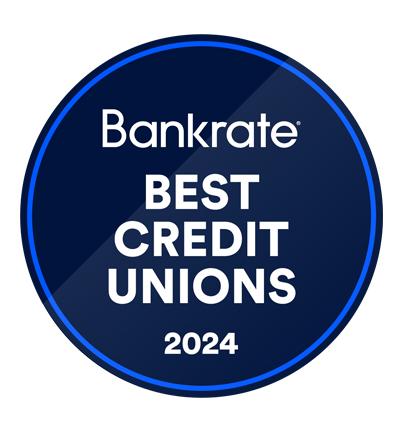High-Yield Savings Accounts That are Good for You and Your Wallet

4.25%
- High-yield savings account
- Access to funds anytime, penalty-free
- No minimum balance
- Current APR is 4.17%
5.00%
- 15-Month term savings account.
- Minimum balance to open and earn 5.00% APY (4.89% APR): $1,000
- Minimum balance to open and earn 5.10% APY (4.98% APR): $100,000
5.25%
- 7-month term savings account for NEW MONEY** Only.
- Minimum balance to open and earn 5.25% APY (5.13% APR): $1,000
- Minimum balance to open and earn 5.35% APY (5.22% APR): $100,000
Whatever You’re into (Savings-Wise) We’re into It Too.
Our premier, online savings products are designed to help you save the way you want to save, whether you prefer the flexibility that comes with a liquid savings account, or the peace of mind that comes with a term account’s fixed, and typically higher, interest rate. Can’t decide? Open multiple accounts for all of your needs, and all of your goals!
HighQ Savings
Term Accounts
Money Management Accounts
Basic Savings Accounts
Calculate Your Future Savings Here
Future millionaires, use these calculators to help you determine: the amount of income your retirement savings could get your during your retirement, your net worth, how much you need to save each month in order for you to realize your next big purchase, and what the value of your term account will be after your term is up.
Retirement Savings Calculator
Net Worth Calculator
Term Account (Similar to a CD)
Saving Goal Calculator
Savings Interest Calculator
What’s a Good Interest Rate on a Savings Account, Anyway?
Compare Our High-Yield Savings Account Rate With the Average Interest Rate.
0.46%*
4.25%APY
*As of 04/14/2024 according to the FDIC. HighQ rate: 4.17% APR as of 04/01/2024.
Not a Member? Join Today!


9x
the national average!
Ready to Start Saving? Here's How:
Apply.
Use our easy, online application to become a Quorum member and open an account with us.
Choose.
During the application process, you can choose to open any savings product(s) you like.
Fund.
Once you’ve chosen the product(s) you wish to open, you’ll have the opportunity to fund your account(s) before submitting your application.
What is a Quorum membership?
As with all credit unions, in order to take advantage of Quorum’s products and services, you must be eligible to join Quorum. Quorum membership is free and part of our online application.
Learn more about Quorum membership eligibility here.
How long does this application take?
The online application takes less than 5 minutes to complete! Once you submit your application, it may take between 24-48 hours to establish your account.
What do I need to apply?
- You will be asked to provide a valid ID, your SSN, and banking information.
- You must be at least 18 to open an account with us online.
- On average, the application takes about 5 minutes to complete.
Log in.
Log in to your account via online banking.
Click.
Under Open, click on “Checking/Savings.”
Choose.
Select the product you wish to open, then follow the prompts to complete the application.
How many accounts can I open?
There’s no limit to how many online banking accounts you can open!
How much money do I need to deposit?
Minimum deposit requirements will vary depending on the type of account you open. You’ll find account requirements for each account as you go through our online application or in the individual product pages on our website.
Are there additional fees?
Term Accounts are fixed and have no additional fees. And so long as you go with eStatements, even our liquid HighQ Savings Accounts have zero monthly fees.
Other Helpful Resources:


All About Online Savings Accounts


How to Make Deposits at an Online Credit Union


Savings Goal Calculator
Why Choose Quorum?


One of the Best Credit Unions of 2024
Bankrate


Best Overall Credit Union Savings Account
CNBC


One of the Top Credit Unions of 2024
CNET


Best Online Banks 2024
MarketWatch


2023 Diamond Award Financial Education
CUNA


Best Checking Account for Vast Network
CNBC


Best Credit Unions
Business Insider
Great rates and service.
Great rates and service. I recently opened a high-yield savings account with Quorum. The process was easy, online banking is comprehensive, and the rate and service were fantastic!
Great rate!
My family and I have several savings accounts as well as a first mortgage and just opened a savings account with a great rate over 4%. Easy online application. Fully digital experience allows us access whenever we need to 24/7. Nice people Five Stars!
Glad we found Quorum.
Quorum is great. We feel so much more secure with a federal credit union than a commercial bank. Great staff and customer service is always patient and helpful. Rates on interest-bearing accounts are great, too. Website is user-friendly. Info is clear and precise. Glad we found Quorum.
Member Reviews
CLOSEHighly recommend.
I have been a member of Quorum for many years. They have always been helpful and very attentive. I highly recommend Quorum for financial business.
Andrea C.
Glad we found Quorum.
Quorum is great. We feel so much more secure with a federal credit union than a commercial bank. Great staff and customer service is always patient and helpful. Rates on interest-bearing accounts are great, too. Website is user-friendly. Info is clear and precise. Glad we found Quorum.
Kathy W.
I’ve been a member for over 35 years.
I've been a member of Quorum Federal Credit union for over 35 years. I highly recommend to anyone that would like low banking fees, a great banking experience and fantastic customer service.
Laurie D.
I conduct all of my banking transactions via the Mobile App.
I conduct all of my banking transactions via the mobile app. I like that I can deposit my checks, and view my account daily balances.
Marla E.
Great rates and service.
Great rates and service. I recently opened a high-yield savings account with Quorum. The process was easy, online banking is comprehensive, and the rate and service were fantastic!
panslif12
This Credit Union quickly became my bank!
This credit union quickly became my bank! What started with a low-interest first mortgage refinance has turned into a first mortgage, two credit cards, a high yield savings account, fee free checking account and a checking reserve account. I pay all my bills via the online bill payment and even send physical checks from my online checking account to the landscaper and others. Member support is beyond expectation and the mobile app is robust and user friendly. Great work Quorum!
mhudson
Great rates.
I've been a member of Quorum for many years. They almost always have great deposit rates and the app is super easy too!
Tbe
Mobile deposits went perfectly.
I was very apprehensive about doing a mobile deposit. I'm still a fan of brick and mortar but that's no longer an option. I spoke to a wonderful woman named Shelley who was just amazing with patience. She informed me of a few banking options. Everything went perfectly as she walked me through the process that I chose.
B Renee B.
Very easy to navigate across the board.
Very easy to navigate across the board, making banking from home a no-effort issue.
7 reasons to smile
I was THRILLED to be able to do mobile deposits.
Since I need to use mail to deposit checks, I was THRILLED to be able to do mobile deposits. This app works better for deposits than either of the other two bank apps I use.
Kim N.
Great rate!
My family and I have several savings accounts as well as a first mortgage and just opened a savings account with a great rate over 4%. Easy online application. Fully digital experience allows us access whenever we need to 24/7. Nice people Five Stars!
DCG021022
Very good service and rates.
Very good service and rates.
Stan L.
Join an online community geared towards helping your financial well-being through top-tier financial tools, competitive rates, and award-winning customer resources. Become a member today and find out why Quorum is consistently selected as one of the top credit unions in the country.


Frequently Asked Questions
Is my money safe and sound at Quorum?
Quorum Credit Union exceeds the minimum financial standards regulators require for a credit union to be considered well-capitalized. Our net worth remains at well-capitalized levels and Quorum has consistently maintained healthy levels of capital and liquidity, even through the most challenging of economic times.
Are my funds insured with Quorum?
Your Quorum accounts are insured up to $250,000 per person by the National Credit Union Share Insurance Fund (NCUSIF). Individual Retirement Accounts (IRA) are insured separately up to $250,000. The National Credit Union Administration (NCUA), a federal agency, administers the insurance fund and regulates federally insured credit unions. The fund is backed by the full faith and credit of the U.S. Government.
Depending on how your accounts are owned and what types of accounts you have, you can potentially increase the total insurance on your funds to greater than $250,000.
The Share Insurance Estimator, found here, can help you determine whether your accounts are established and insured appropriately. If you have already utilized the Share Insurance Estimator and still have additional questions, you can also reach out to the NCUA Consumer Assistance Center at (800) 755-1030. Representatives are available from Monday through Friday from 8 a.m. – 5 p.m. ET. You can also send an email with your questions to dcamail@ncua.gov.
I have more than $250,000 in deposits at Quorum. How do I check to see if it is insured?
If you have more than $250,00 in deposits and are concerned that your savings may not be fully insured by the NCUA, you can check the Share Insurance Estimator here to understand what is insured and what portion (if any) exceeds coverage limits.
Depending on how your accounts are owned and what types of accounts you have, you can potentially increase the total insurance on your funds to greater than $250,000 through multiple account owners or trusts with beneficiaries.
MyCreditUnion.gov contains more information about the National Credit Union Share Insurance Fund coverage for consumers.
What are dividends?
Dividends are essentially credit-union-speak for interest. It’s the money we pay you for leaving your deposits with us.
What is Annual Percentage Yield (APY)?
APY is the amount of interest you earn on money you deposit into a savings accounts (including high-yield savings accounts), over the course of a year. How often interest is compounded is also figured into the APY.
If you are considering two or more bank accounts for your savings, it pays to compare the APY on each for the full picture on how much your money and account balance can earn over a year.
What is the significance of the APY? In its simplest form, the higher the APY, the more money you earn. If you have $25,000 invested in a one-year term account with a 2.86% APY, at the end of the year, you will have earned $715. With a 2.50% APY, your return would be $625.
You may see a higher annual percentage yield (APY) on accounts that have a higher minimum deposit and a longer commitment for how long you must keep the money in the savings account. Be sure to familiarize yourself with the terms and conditions of any bank account you open.
I’m interested in opening a checking/savings account with Quorum. Do they perform a hard/soft pull credit inquiry when reviewing the application?
A hard pull or soft pull can occur when you open a new checking or savings accounts from an online banking, credit union, or financial institution. A hard pull (which typically happens when a lender checks your credit report to make a lending decision; for instance, when applying for a mortgage) can (temporarily) slightly lower your credit score, and will typically stay on your credit report for two years. A soft pull, on the other hand, is an inquiry performed by a financial institution on your credit report, but does not affect your credit score in any way.
When Quorum reviews a checking or savings account application, we may perform a soft pull on an applicant’s credit report through one of the three major credit reporting agencies (TransUnion, Experian, Equifax) for verification purposes, and also run the name through ChexSystems to see if there is a report in their system. Neither of these actions will impact an applicant’s credit score in any way.
How does a checking account differ from a personal savings account?
Checking accounts allow you to access your money to shop, pay bills or withdraw cash from locations across the globe. They are well-suited to pay for your daily or recurring expenses. A regular savings account, on the other hand, offers the added benefit of earning higher dividends, or a compounded return on the funds you deposit over time. These dividends compound at intervals set by the financial institution, but usually occurs either annually, quarterly, monthly, or daily. (Quorum compounds dividends monthly.)
Savings accounts are, by design, not suited to pay for daily purchases. If your monthly budgeting and bill payment plan requires multiple transfers each month from a savings account, or you believe you may routinely exceed six transfers per month, consider a checking account, or setting up multiple savings accounts.
What is compound interest?
Compound interest simply means earning interest on interest. When interest compounds daily, your interest is broken into 365 smaller payments. When it compounds monthly (Quorum compounds dividends monthly), it is paid in 12 payments. If interest is compounded daily, interest added on Tuesday will earn interest on Wednesday, and then the new amount will earn interest on Thursday—and so on. If interest is added monthly, the interest earned for a specific month will be paid once each month.
While it is true that the more often interest is compounded, the more you stand to earn, it’s important to remember that when looking at APY, you are looking at the annual yield, not the rate. That means, when you see a high-yield savings account that advertises 2.00% APY, you will have earned 2.00% on your balance by year end, whether it is compounded daily or monthly: APY is the equalizer and allows you to compare apples to apples.
How does a savings account differ from a term account (similar to a CD)?
When comparing a term (similar to a CD) and savings accounts, it helps to understand their differences by looking at factors including:
- Accessibility of funds: With a traditional savings account, your funds are liquid, meaning you have fast and flexible access to cash, whenever you need it (it’s important to note that withdrawals are limited to six times per month, per savings account, per Federal Regulation D; click to learn more about what qualifies as a withdrawal). However, with term accounts, you invest a specific amount of cash, for a particular period ranging from a few months up to five years or more. If you withdraw these funds before the end of this maturity period, you will pay penalties up to several months’ of accumulated dividends.
- Interest rates: Financial institutions set and adjust the interest rate in savings accounts over time as the Federal Reserve funds rate rises and falls. However, term accounts allow investors to lock in a fixed rate of return for a specific period (or the term) of the account. Generally, if you have a longer term and larger investment, you can secure a higher interest rate upfront.
- Initial deposit: Most financial institutions offer savings accounts with a minimal (under $100) initial deposit (Not HighQ; there is no minimum deposit for a Quorum’s high-yield savings account, HighQ!). Term accounts, on the other hand, often require initial funding in the neighborhood of several hundred or thousands of dollars.
- Account fees: Savings accounts rarely include maintenance fees (and if they do, they’re often avoidable if you use them as designed). Similarly, account fees for term accounts are not common. (However, don’t forget that you will pay a fee, or penalty, to withdraw funds from your term account before the end of the pre-agreed upon maturity period.)
- Adding funds: Savings accounts allow you to add funds at your discretion. This feature is especially useful if you wish to set up automatic deposits into the account each month (a great way to put your savings on autopilot). Term accounts, however, rarely offer consumers the ability to add additional funds. You add the required funds upfront, and then stand on the sidelines to watch them grow until the maturity date arrives, at which point you can either cash them in or roll over your funds to a new term account.
Does Quorum offer mobile banking or mobile deposits?
Yes, our iOS and Android mobile banking app allow you to pay your bills, view your savings account or checking account balances and history, send secure messages, and perform transfers, anywhere, anytime. Our mobile banking app also allows you to snap pictures of your check to make a deposit anywhere, anytime.
Download the Quorum mobile banking app today to get started!
Search for “Quorum” in the App Store or Google Play, to download our app directly to your mobile device.